08:42
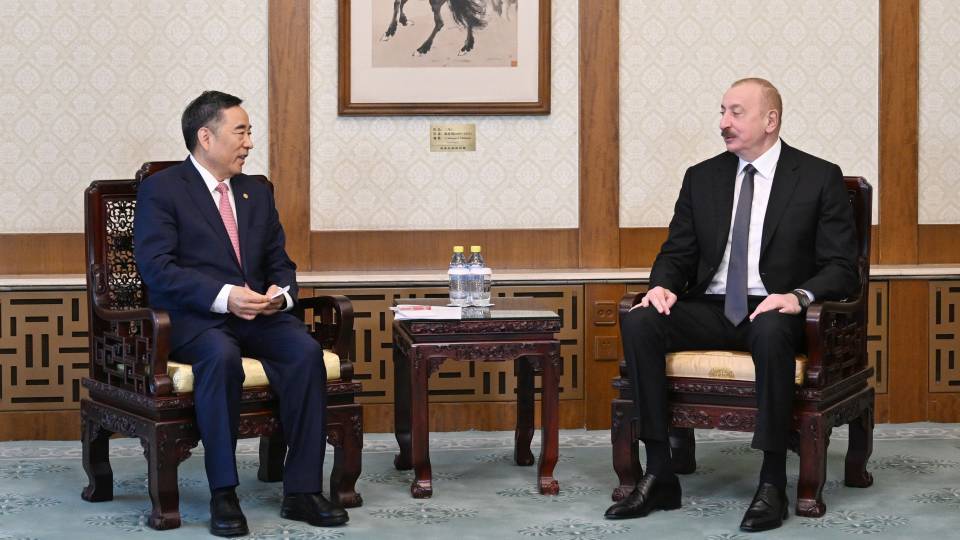
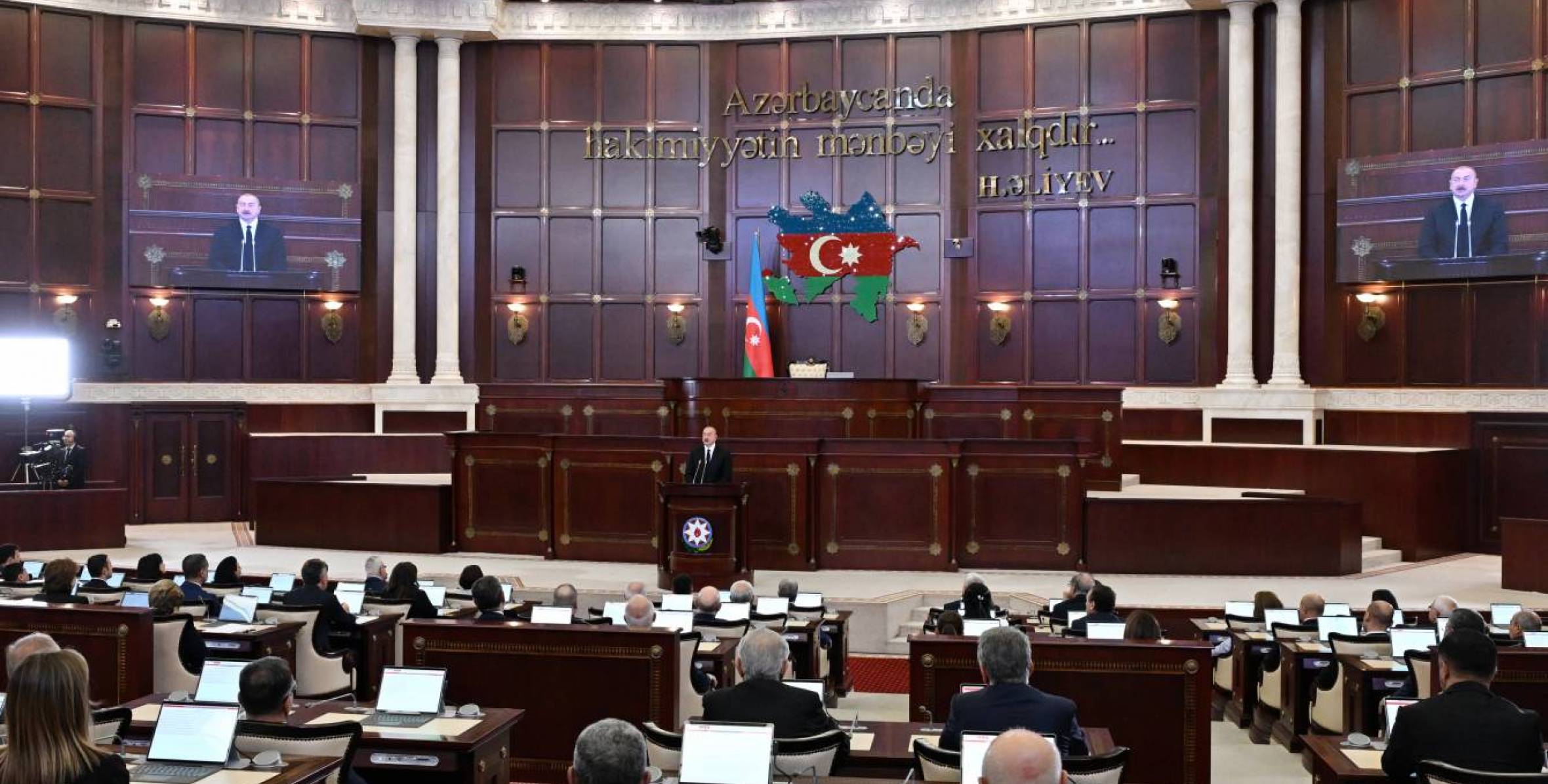
- Dear MPs, ladies and gentlemen.
The Milli Majlis of the seventh term is beginning its work today. I would like to sincerely congratulate all the MPs on this occasion and wish the Milli Majlis success.
I am sure that the Milli Majlis and its MPs will continue to contribute to the comprehensive development of our country with their work, thus ensuring the sustainable development of Azerbaijan.
This year’s presidential and parliamentary elections were held across the entire territory of our country for the first time in the history of our independent state - truly a historic milestone. The Second Karabakh War and the full restoration of our sovereignty are globally significant events. The people of Azerbaijan, through strong will and unity, put an end to a 30-year occupation. Our state has demonstrated its strength, and our people have displayed their indomitable spirit to the world.
I am confident that the year 2024 will be remembered for this reason: the presidential and parliamentary elections were held in all territories, and once again, the people of Azerbaijan showed their determination.
The full restoration of our sovereignty after the Second Karabakh War and the anti-terrorist operation presents ample opportunities and opens new horizons for our country. The 30 years of occupation are now behind us, and we have embarked on large-scale construction and development, with visible results. Over the past three to four years, our international standing has been further strengthened. We have succeeded in having the outcomes of the Second Karabakh War and the anti-terrorist operation acknowledged globally.
However, some countries and circles did not, and still do not, want to accept this reality. We continue to face baseless accusations and double standards. But this will not sway our resolve or that of our people in any way.
Just a year has passed since the restoration of our state sovereignty. Three days ago, we already celebrated this day as a national holiday. However, I must emphasize that there is no reason for complacency. We will cherish this glorious history in our hearts forever. The people of Azerbaijan, all future generations will be rightly proud of this glorious Victory. However, we must fulfill the tasks ahead to ensure our continuous development, strengthen our nation, and secure a safe future for the Azerbaijani people. Therefore, I would like to take this opportunity today to share my thoughts with you and the people of Azerbaijan about some of the tasks ahead of our country.
The number one priority is to further increase our military strength. Although the Second Karabakh War and the anti-terrorist operation are now in the past, the processes unfolding in the world - new conflicts, the emergence of war zones, and rising tensions around us, along with revengeful tendencies in Armenia - compel us to keep this area in the spotlight at all times. Without military power, we cannot succeed in any sphere - neither economic nor political. I firmly believe that the history of independent Azerbaijan, including the 30-year occupation, is clear evidence of this. Without military capability and strength, we would never have been able to liberate our lands from the invaders.
Not only political figures, but I believe anyone in the world can see that the concept of international law has been completely undermined. The security architecture formed after World War II no longer exists, the principle of "Might is right" now prevails, and some major states no longer even hide this. In fact, we have been pursuing a policy in this direction for many years. During the occupation, increasing our military strength was always our top priority. Every year, when our state budget was approved in the Milli Majlis, military expenses were prioritized. This should remain the case today.
Yes, the country faces significant tasks - first and foremost, the restoration of Karabakh and East Zangezur. However, if we reduce our attention to the military sphere and fail to ensure adequate funding, future problems may arise.
Revengeful forces are rearing their heads in Armenia. These are not only marginal political elements; today's Armenian government lives with these ideas and fantasies as well. They do not want to come to terms with the results of the Second Karabakh War and the anti-terror operation. Although they say one thing, their actions, policies, and steps paint a completely opposite picture. The formal retention of the Minsk Group, which has had no functional significance to date, is proof of this. Everyone knows perfectly well why the Minsk Group was created – to resolve the Karabakh conflict. The Karabakh conflict has been resolved, completely, once and for all.
The official circles of Armenia seem to acknowledge this in their statements. But at the same time, despite our insistence, keeping the Minsk Group officially active can only serve one purpose – territorial claims against us may arise again. The countries supporting Armenia, their activities, decisions, resolutions, and statements - all this shows that this dirty game against us is not over yet. Foreign circles unable to accept our Victory are nurturing new plans against us. There is no need to elaborate further on this, but the information available to us supports that.
This is exactly the purpose of the media campaign, the slander, libel and defamation campaigns - to keep this topic on the daily agenda and live with the hope that one day if Azerbaijan stumbles or weakens, these ugly actions against us will start again. In other words, we should be aware of that. The government of Azerbaijan knows this, and the public should know this too. Therefore, we have no right to be complacent.
This is why I am saying it again: the number one priority is to build up our military strength, and we are doing that. Following the Second Karabakh War, we have significantly increased our military capacity, new armed units have been created and the number of special forces has been increased several times. New special forces and commando units have been set up, and their number will increase year by year. Other special purpose units have also been established and they are trained day and night. The combat capability of our army is increasing and their provision with equipment is and will be maintained at the required level. Armenia, and any country backing it, should understand that speaking to us in the language of blackmail and ultimatums is futile. We are prepared, capable, and always ready to respond.
Simultaneously, we must develop our domestic military industrial complex more rapidly. Major funds have been allocated for this purpose this year and will be allocated next year as well. Large-scale modernization work is underway in all our military production facility. Therefore, new equipment, hardware and ammunition are manufactured. The establishment of new production sites in collaboration with several foreign partners has already begun to take practical shape. In the next year or two, our military industrial complex will grow even larger both in terms of the assortment and quality of the products.
There are several goals here. First of all, the creation of a domestic military industrial complex is evidence of the overall strength and development of a country. Secondly, we should be less dependent on external markets. Of course, it will not be entirely possible to eliminate this dependence. We should be aware of that. But we should provide ourselves with local production to the maximum extent. Technological innovations in this field, especially in modern times, will strengthen our overall intellectual potential. Because the personnel working in this field are establishing and will continue to build their work on entirely new technological and methodological foundations. Thousands of new jobs will be created. These are not merely plans, but concrete projects that we have already implemented. While there is no need to go into detail about these projects, I should emphasize that this will remain one of our top priorities in the coming years.
Another factor is that the countries dominating the global arms market are currently focused on addressing their own internal needs. Therefore, there is a natural shortage in the world arms market. We should also take this into account. At the same time, this field will allow us the opportunity to expand the export geography of our military-technical goods. Today, Azerbaijan exports products from its military industrial complex to dozens of countries, and this geographical reach expands each year. This is also a part of our negotiations with several countries, including discussions in the economic and investment fields. In the near future, we will become a major player in the global arms market, and we have the potential to achieve this.
You are also aware that we have recently announced this field open to the private sector, and I am pleased that the private sector has responded positively to my call. Several Azerbaijani private companies are already involved in the development of the military-industrial complex, of course, on the condition of obtaining licenses from the relevant state institutions. This involvement will enable production in this field to reach billions of dollars in just a few years.
Another important priority is related to the protection of our borders. I have already shared my thoughts about this with the public several times. Currently, engineering work is under way on our conditional border with Armenia. At the same time, our border with other neighbors should be equipped with modern infrastructure.
After the Second Karabakh War, the length of our conditional border with Armenia, which used to be under occupation, exceeds 500 kilometers. The natural terrain and geography of this border are very challenging. It is located in harsh environments in terms of climate, making it difficult to carry out services there. Some of our locations sit at an altitude of over 3,000 meters. Despite this, our military positions along the border are being reinforced. We are strengthening the conditional border because any provocation from Armenia can be expected at any moment. The Armenian side is becoming extensively armed.
In the meantime, it conducts military exercises with foreign countries and major powers. Western countries are sending weapons and ammunition to Armenia. In some cases, it is open, as in the French-Armenian military cooperation, while in some cases it is concealed. However, we need to be informed about everything now. We know who sends what to Armenia and when, which military cargo planes land at Armenian airports, and which military products are transported to Armenia on those cargo planes. In other words, the plans of some Western countries to turn Armenia against us are obvious. Of course, they do not care about the Armenian people. The Armenian people are just a tool in their hands, a tool for keeping Azerbaijan under constant pressure, using the territory of Armenia to create sources of threat for Azerbaijan and Armenia’s other neighbors, and thus, securing their own interests. This methodology is quite straightforward. But they should also know that we will not tolerate that. I have already said that if we see a real threat, it will not be very difficult for us to nip it in the bud, no matter where it arises. Everyone should understand this. Border protection should be organized through visual, infrastructural, and technological means. However, we must all recognize that this is a significant and large-scale task.
Strengthening the border with other neighbors is one of the most important conditions, and I am sure that the people of Azerbaijan also understand this. Our land borders are still closed, specifically for the movement of people. We do understand that this creates certain difficulties. However, today's geopolitical situation is quite obvious, and this is the only appropriate step to ensure internal security. All necessary measures are being taken to protect internal security. There are also threats - both real and potential. Relevant agencies are working hard to eliminate these threats. The public is also updated on this issue as much as possible, and information is provided. However, since this area is very sensitive, I believe the people of Azerbaijan understand that it would be inappropriate and harmful to discuss it openly. But I can say with absolute certainty that the closure of our land borders over the past few years has saved us from many major disasters. Even today, with the borders closed, dangerous developments unfold and are being prevented. While there are no internal risks in Azerbaijan, the protection of our borders will safeguard us from external risks.
There are no internal risks in Azerbaijan. Security and peace have been ensured in Azerbaijan for many years. Our stability can be an example for the whole world. Everyone knows that no country can develop in the absence of stability. Today, everyone can see the situation and the fate of destabilized countries. This is the primary condition for security, development and the attraction of foreign investment. All other security measures are also in place. Azerbaijan is a powerful state and our strength is increasing by the year.
Another important task is related to ideological security, and here too, we must always be careful. Ideological provocations against us are continuing. It is true that they have not yielded any results yet, because the strong will of our people and our national spirit stand in their way. It is impossible for any ideological provocation to take root here. But at the same time, this should not make us complacent. Therefore, we must always be ready for it and expose the dirty games played against us, as we have done officially, in the public space and in the media. I believe that the people of Azerbaijan see everything perfectly well, understand everything clearly – who is our friend and who is our enemy. The primary criterion is the attitude of the countries toward the restoration of our sovereignty. That is the dividing line. Those who supported and congratulated us on the restoration of our sovereignty are our friends. Who was and is against it? They cannot be our friends. During the occupation, this was not so clear. It was clear to us, but not to the general public.
Because foreign propaganda was once deeply rooted in Azerbaijan, and not just from one source, but from several ones. Foreign forces and countries were competing for having a say in Azerbaijan’s public opinion. They aimed to change the situation in their favor by instigating a provocation in our media through their accomplices. In other words, there have been many such attempts, but the strong will and unity of our people have prevented this from happening. This continues to this day.
This is why I repeat - there are very simple criteria. Whoever is pleased about the return of Karabakh to Azerbaijan is our friend and a brother. Whoever is disappointed by this and seeks to incite the separatists again—whoever invites them to foreign countries, provides them with visas, or conducts a smear campaign against us using various means - how can they be considered our friend? This is why, as they say, everything is clear and visible today. Let me reiterate: there were no such open and provocative steps taken against us during the occupation. That occupation served the interests of the forces opposed to us—keeping the state of Azerbaijan under constant pressure, ensuring it always needed mediators, and allowing our people to suffer morally, while the refugees endured hardship. It does not take a great mind to understand the feelings of those who have lost their land. We have freed ourselves from this trouble, and the masks of the anti-Azerbaijani forces have been torn away. We can see it today. I believe there is no need to name anyone; everyone can see for themselves. Therefore, issues of ideological security should always be in the spotlight for state institutions, legislative bodies and public activists. We are certainly taking our own steps in this matter and will continue to take them.
I would also like to touch upon another issue. I said this at the opening of the Garabagh University in Khankendi three days ago, and I want to repeat it. The significance of this issue highlights that educating the young generation in the national spirit is more than mere rhetoric. It is the primary guarantor of Azerbaijan's future development because countries are governed by their people. The ideas, thoughts, and courage of the people largely determine the positive or negative characteristics of a nation and its overall situation. Therefore, we should bring up a young generation that would be knowledgeable and educated, they should be attached and devoted to the Motherland. They should not succumb to external influence; they should be proud. In fact, after our glorious wars, including the Second Karabakh War and the anti-terrorist operation, if we are not proud, then who should be? Who achieved this brilliant victory in just 44 days, at the cost of martyrs? May Allah rest the souls of all our martyrs in peace. The anti-terrorist operation, which lasted several hours under tremendous foreign pressure—excluding other factors—successfully rooted out separatism in Azerbaijan. Who else could have achieved this? In other words, it is the people of Azerbaijan who have the greatest right to be proud of our country and its achievements.
This is why we, our entire society, should always be vigilant. I also said this in Khankendi: the primary sources of education are family and school. This is the key. Of course, society, the general atmosphere prevailing in society, – all this has a serious impact on the consciousness and future of the young generation. Therefore, this issue should always be in the spotlight. I am sure that this will be the case. Our MPs, of course, should also always keep this issue in mind during meetings with their constituents.
The restoration of Karabakh and East Zangezur is, of course, an important task for all of us.
If I start to list the things we have done since the Second Karabakh War, I will have to speak here for hours. I would just like to bring a few figures to your and the public's attention. After the war, the amount allocated to be spent by the end of this year is 19 billion manats, with most of the funds directed toward infrastructure projects. Simultaneously, efforts are being made to return former internally displaced persons (IDPs) to their homes, and more than 8,000 former IDPs have already resettled in Karabakh and East Zangezur. This number will continue to increase each month and every year.
Infrastructure projects have reached very large proportions, 3,000 kilometers of automobile roads have been built. Among general projects, 45 tunnels are to be built and the overall length of these tunnels is 70 kilometers, and it is not an easy task to build a tunnel and a road in those mountains. The construction of 450 bridges and overpasses is also planned. Railways and two international airports have been commissioned.
Energy potential has been strengthened and 270 megawatts of hydropower plants have been put into operation in the three years, and this process is ongoing. Schools, hospitals, social facilities, villages are under construction. In a nutshell, large-scale work is under way for the revival of Karabakh and East Zangezur. I am unsure if similar restoration work has ever been done in any country in history. However, this demonstrates that addressing this issue has always been paramount for us—new settlements were built for IDPs both during the occupation and especially under current conditions.
Specific work is under way to protect our cultural and historical heritage. We are restoring our historical monuments. Seven mosques destroyed by the Armenians have been rebuilt. The construction of another eight is still underway. Victory museums, occupation museums, victory parks, such large-scale work is in progress in this geography. This, I repeat shows the great capacity of our people. I am not only referring to financial resources here. Additionally, the state we have built possesses technical capabilities and focuses on personnel training. Undertaking tasks such as laying power lines in mountainous areas over 3,000 meters high during winter requires exceptional professionalism.
This is the potential of our country. We are prepared for it. As soon as we freed our lands, we started this work immediately. Let me just say that the 44-day Second Karabakh War was not yet over when we had already begun constructing the road infrastructure in the Aghdara district. Of course, things will go faster in the coming years. In the near future, the next year's budget will be discussed in the Milli Majlis. I am sure that MPs will approve the government's plans for Karabakh and East Zangezur, and we will ensure it.
Of course, we must have the economic means to accomplish that. I must emphasize that we are undertaking all these efforts at our own expense. To date, Uzbekistan and Kazakhstan have been the brotherly states that have helped us in the reconstruction work. A school and a children's creative center have been built in Fuzuli, and currently, the Kyrgyz Republic is also constructing a school in the Aghdam district. Other than that, we have not received a thing from anyone. We are doing all these things at our own expense. There are plenty of donor organizations in the world, but they are indifferent to this issue. Thousands of foreign representatives have witnessed this vast area in its current plight. Their observation, coupled with inaction, reinforces that this attitude toward us must be acknowledged. This should serve as a reminder that we must rely solely on our own strength and trust in our own potential.
I think that this year's economic indicators have been positive. In the first eight months, the economy grew by more than 4 percent, in the non-oil sector it was 7 percent. We have been reducing our foreign debt year by year on my instructions, and today it accounts for only 7.5 percent of our GDP. We have repaid most of the key loans, and when we consider our debt in absolute terms, it amounts to approximately 5.3 billion dollars. We can repay it in one day. I don't want to compare ourselves to any other country, but let me give you one figure: in some developed countries, including some countries that attempt to lecture us, the foreign debt accounts for 100 percent of the GDP or more. So, this is just a small reference.
Of course, in order to implement our future plans, including the improvement of the well-being of our citizens, the economy must constantly develop. We have implemented four packages of social reforms since 2018. The value of this package of social reforms is 7 billion manats and it covers four million people. During the last five years, the minimum wage in Azerbaijan has increased 2.7 times and the minimum pension 2.5 times. I must also inform you that an instruction has already been given that the minimum wage and minimum pension be increased again from next year.
In other words, this social-oriented course once again shows our overall policies and intentions. Of course, the diversification of the economy, the development of the non-oil sector and the expansion of local production are the primary conditions for pursuing our policy in this direction in the future. Today, new production sites are opening in all regions of our country, including Karabakh. The opening of the “Istisu” mineral water factory has a tremendous symbolic meaning, and “Istisu” is on our tables again. This carries enormous symbolic significance and represents the restoration of historical justice. After all, the Armenians destroyed both the factory and the sanatorium that operated there during Soviet times.
I would also like to touch upon the issue of normalization of relations with Armenia. I would like to state again that peace negotiations were initiated by Azerbaijan after the Second Karabakh War. At that time, neither Armenia nor any other country in general had developed their own opinion about what the future would hold. It was our initiative. After some time, when we noticed that our initiative went unanswered, we laid out the basic principles, made them public, and initiated the process. But what do we see now? We see that Armenia is artificially delaying this issue. Since we sent our first draft to Armenia, there have been 10 exchanges of comments, and each time, certain provisions were agreed upon, indicating some progress on this front. We should state everything as it is.
But at the same time, as months passed, we naturally expected Armenia to share its comments with us more expeditiously. However, we saw the exact opposite. We had to wait 70 days to receive the most recent version of the comments from them. On June 24, our comments were sent to them and they responded in late August or early September. What was their response? All non-agreed provisions were removed from their version of the draft peace treaty. In other words, such a primitive and inadequate step was unexpected. The provisions that were removed from the text - those proposed for removal at their request - are significant. Without them, the peace treaty will be incomplete.
Such an insincere attitude is, understandably, thought-provoking. In addition to the factors I have just mentioned, if we put all these facts into a framework, we will see that the rapid armament, the tendencies for revenge, and the renewed focus of Armenia's patrons on the issue of Karabakh suggest a troubling pattern. This inadequate and insincere attitude toward the progress of the peace agreement, along with delaying tactics and other issues, indicates that Armenia does not want peace; rather, it seeks to buy time and use this period to strengthen its military potential with the support of its foreign patrons.
Representatives of some European countries, not only European but also other Western countries have already started working in the Armenian army. A so-called “European Peace” or “observer” mission has been illegally established on our border, while this represents a violation of the agreement reached. I would like to remind both the European Union and Armenia that an agreement was reached at the Prague meeting in 2022, and yes, we also agreed – that a small number of observers could be stationed on the Armenian side in the direction of the conditional border, for only two or three months. That was the agreement. However, after that, they extended it without our approval, increased their numbers, and included representatives from Canada, effectively turning it into a NATO mission. Following this, a form of "binocular diplomacy" was employed against us. Foreign representatives observed us day and night through binoculars. What were they trying to show us? Was this a demonstration or just a cheap spectacle? All these factors are thought-provoking, and we take them into serious consideration.
Therefore, if they are not interested, normalization of relations with Armenia will not happen. In any case, we will not take a step back from our position. They can say what they want, we do not need mediators. Indeed, we do not object to some mediation proposals, simply for the sake of political correctness. But we do not need a mediator. We delimited the state border with Armenia without mediators. We clearly stated that the four villages in the Gazakh district should be returned to us unconditionally, and I reiterated this in February of this year. I believe these words were quite convincing, as the four villages that had been under occupation were returned to us without any mediators or conditions. Consequently, we have commenced not only delimitation but also demarcation.
This is why we do not need any mediators in the negotiations. Armenia should not rely on that either. In general, it should not rely on anyone else. If they want to live in this geography and if they want to live in security, they must make serious adjustments to their policies towards their neighbors. This is first. Second, neither they nor those behind them should ever forget the 30-year occupation. However, they want to erase it from memory and expect others to forget it too, as if this occupation never occurred. They should also not forget the outcomes of the Second Karabakh War. The Armenian army was crushed. Armenia signed an act of capitulation. After that, I issued the order to halt the glorious Victory march of the Azerbaijan Army. Today’s reality clearly demonstrates that this was the right decision, and the subsequent events have confirmed it. Therefore, September 20—the day of the full restoration of our sovereignty—should not be forgotten, and this historic truth must always be present at the negotiating table.
After World War II, no one offered a peace treaty to Nazi Germany. Fascist Germany was divided into several parts, and the capitulating fascist state was punished. In contrast, the capitulated fascist state here has not only avoided punishment but has also received numerous privileges. America is currently providing them with 250 million dollars, which they will use for their internal purposes, while a portion of that money will be allocated to purchase weapons to harm us. Who bears this responsibility, and who will be accountable in the future? Those providing this money, including the so-called “European Peace Facility,” demonstrate a remarkable level of hypocrisy. The fund is intended for weapons, yet they label it as a Peace Facility. Armenia benefits from this arrangement, receiving free weapons from France. And this money is not being repaid from any other sources either.
This is a serious matter, but I prefer not to elaborate extensively on it. Simply put, our terms remain unchanged. Those supplying arms to Armenia should be aware that they will bear direct responsibility for any future developments. Naturally, any official territorial claims against us must cease. Additionally, Armenia’s constitution should be amended, and the Minsk Group should be dissolved.
During the years of occupation, our foreign policy was primarily focused on this direction. Now, following our historic Victory, we have gained greater freedom in our foreign policy. On this occasion, I would like to emphasize that an independent and principled foreign policy is our main priority. We have never acted against anyone or interfered in anyone's affairs. However, we have consistently taught a lesson to those who attempted to meddle in our matters, making it clear that they should not do so. Such attempts exist and will continue to arise, but it is true that they carry little significance.
However, this factor will always be considered in our foreign policy. Whoever wishes to cooperate with us on a bilateral basis, rooted in mutual respect, will find that we are willing to enhance our cooperation. However, if someone believes they can come and dictate their will to us, accuse us without justification, or defame us by any means while expecting to maintain a friendly relationship with these countries as if nothing has happened, that is a misguided notion; it will not happen! Azerbaijan has long established itself as a dignified and proud state. Especially after our historic Victory, our international reputation has grown even stronger. Our standing in the international community has been reinforced, and many nations are aligned with us. Some Western countries seem to believe that the international community consists solely of them and their dependent states, which I prefer not to name. No, the international community encompasses all countries of the world, and nearly 200 nations voted unanimously in our favor. The decision to hold COP29 in Azerbaijan reflects this unanimous support and underscores our international authority and respect. Moving forward, there will be no regression in our foreign policy. The number of our friends across all continents continues to grow. We will conduct a more active foreign policy now - after the Second Karabakh War and after restoring our sovereignty. We are now establishing very serious contacts with regions where we previously had no presence. We are reviewing investment projects, and new opportunities for cooperation in various fields are emerging. Naturally, our relationships with traditional partners and friends remain strong and will continue to develop.
Certainly, our country has many other tasks ahead. I would like to once again congratulate all members of the Milli Majlis on the commencement of the seventh term of the parliament. I wish you all robust health and the best of luck. Thank you.

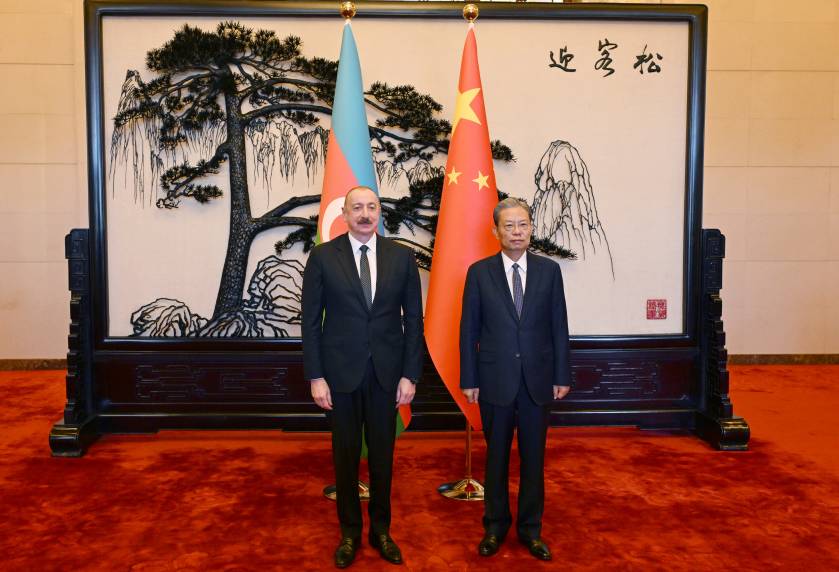
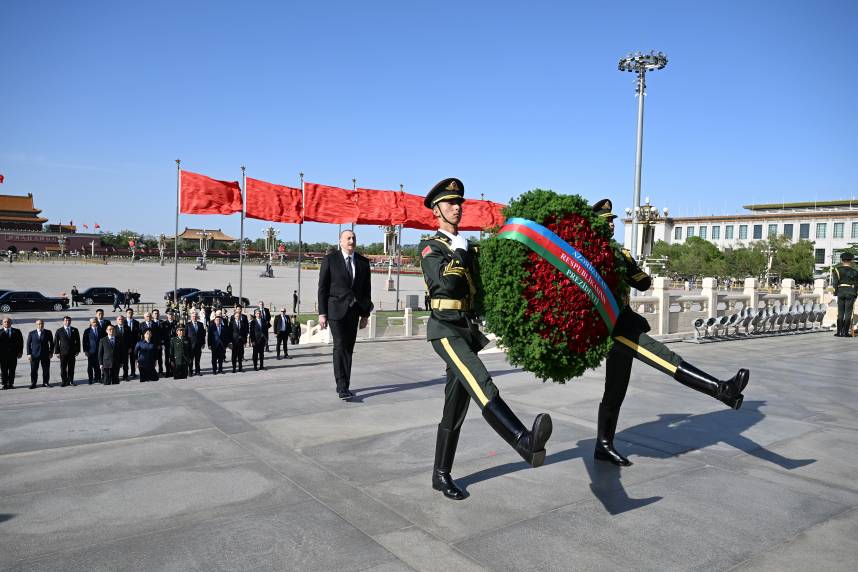
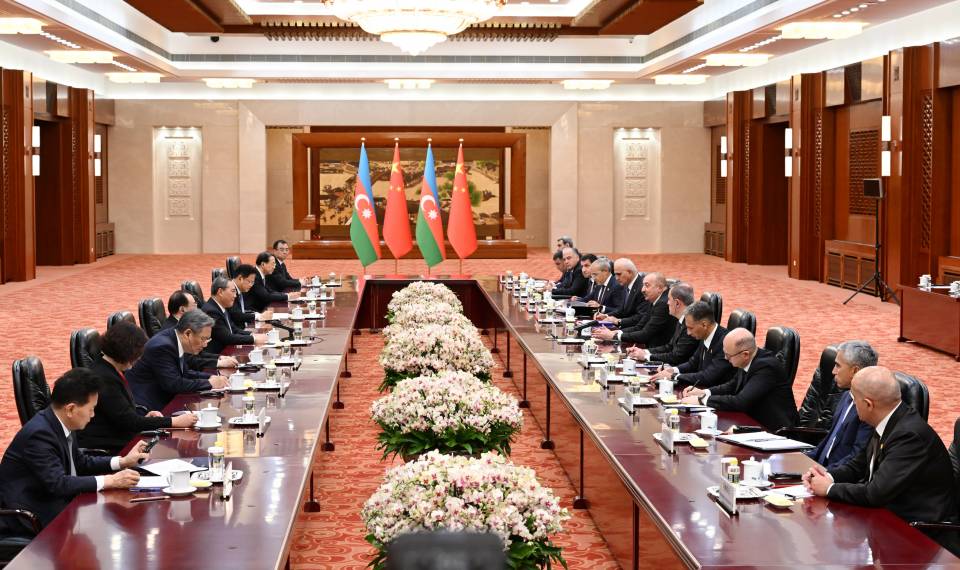
On April 23, President of the People's Republic of China Xi Jinping and First Lady Peng Liyuan hosted an official banquet in Beijing in honor of President of the Republic of Azerbaijan Ilham Aliyev and First Lady Mehriban Aliyeva.
23 April 2025, 12:15The “Joint Statement on the Establishment of a Comprehensive Strategic Partnership between the Republic of Azerbaijan and the People’s Republic of China” was signed in Beijing on April 23 during the state visit of President of the Republic of Azerbaijan Ilham...
23 April 2025, 10:57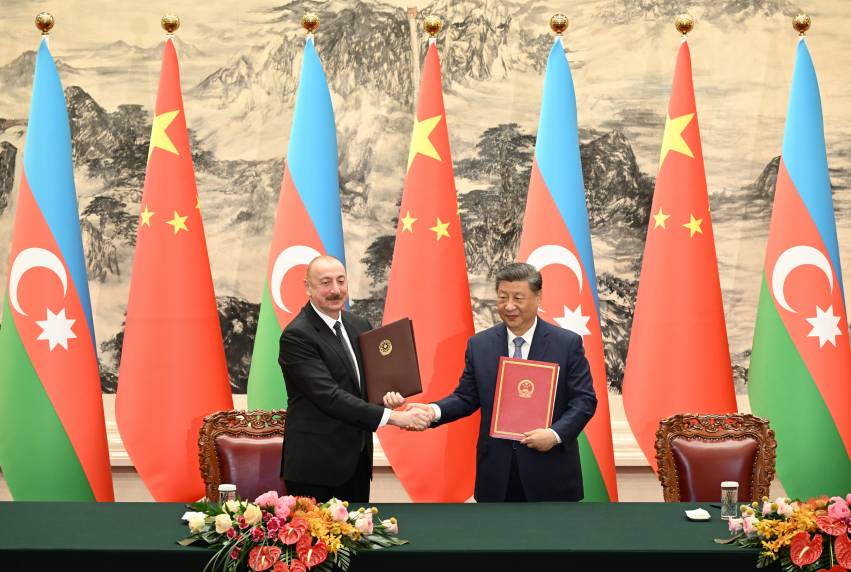
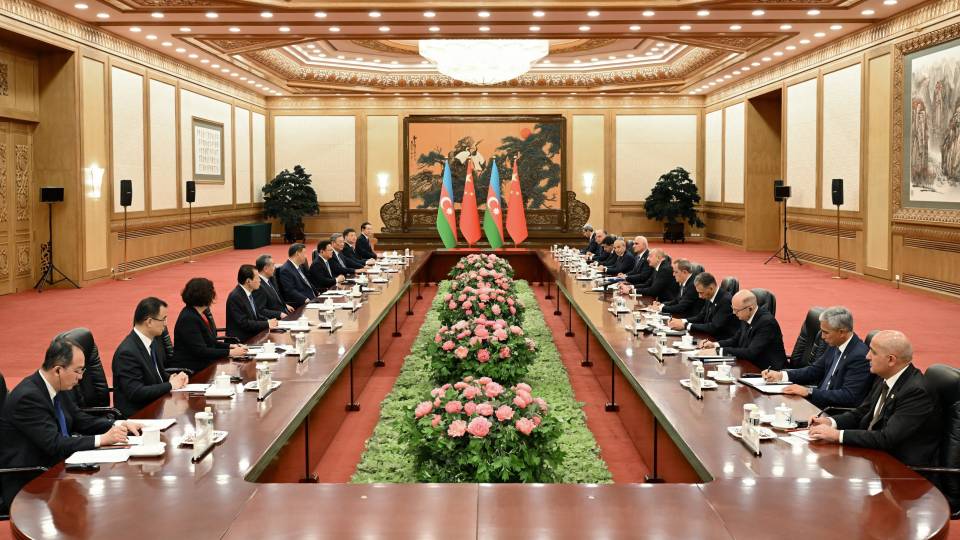
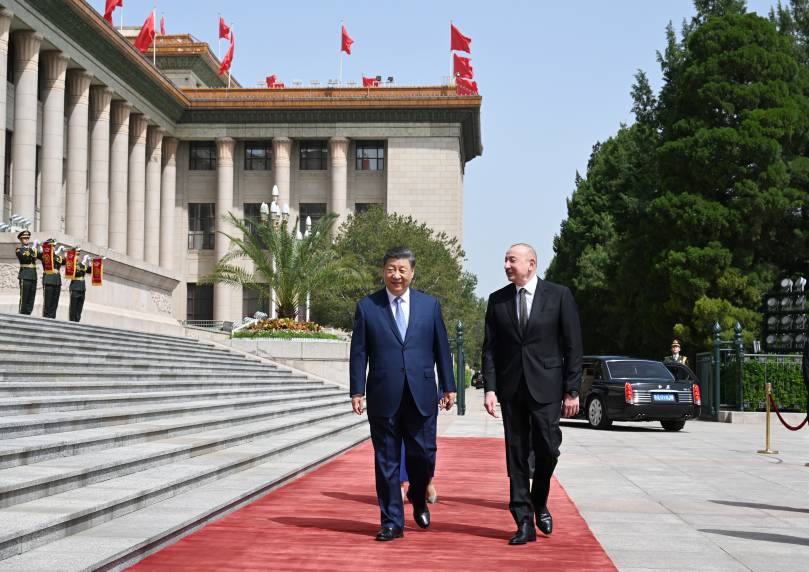
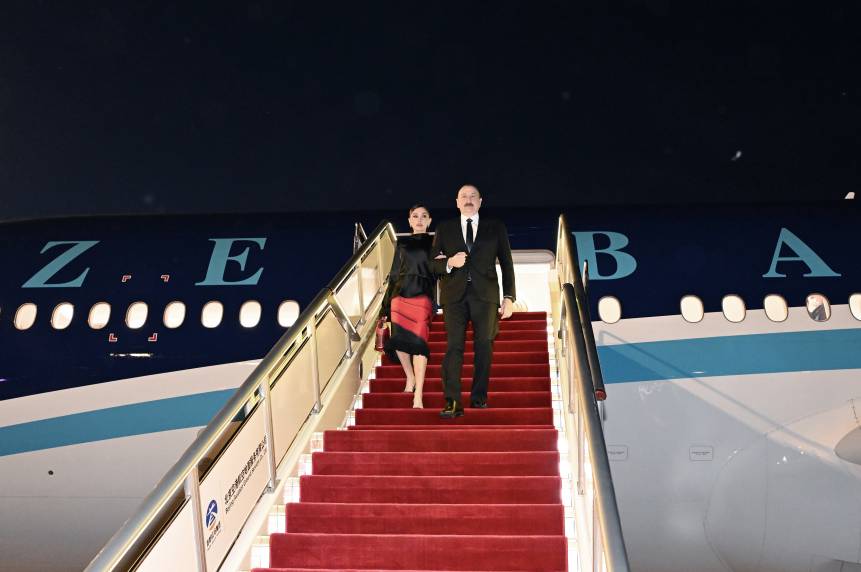
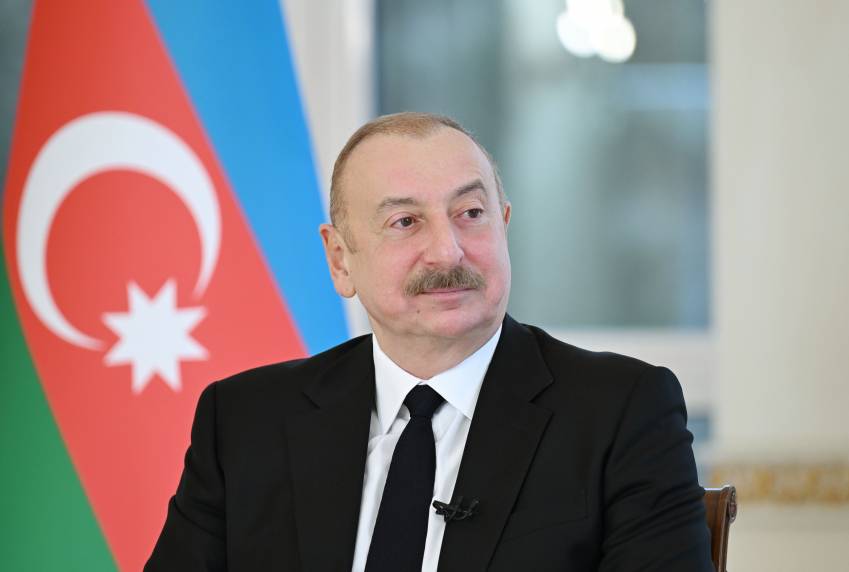
Your Eminence,
We were deeply saddened to hear of the passing of His Holiness Pope Francis, Head of the Holy See and one of the most prominent religious figures of our time.
In the person of Pope Francis, the international community and the Catholic world have lost...
21 April 2025, 14:13